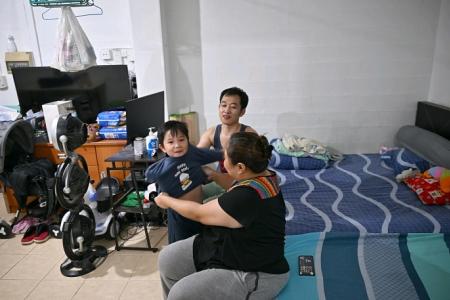Most families on ComLink+ scheme don't send kids to pre-school regularly
The majority of children from families on a new scheme to give low-income households a leg-up did not attend pre-school regularly.
Only 26 per cent of families on the ComLink+ scheme that enrolled their children in centres run by anchor operators, such as PCF Sparkletots Pre-school and My First Skool, had been sending all their children to pre-school regularly as at December 2023.
An average attendance rate of 75 per cent or higher a month is considered regular.
However, most of these families, or 85 per cent, with children aged between three and six have enrolled their children in pre-school, according to a report released by the Ministry of Social and Family Development (MSF) on Nov 19.
The Supporting Lower-Income Households Trends Report highlighted key trends in social support and progress made by lower-income households.
The report captured the baseline data of families on the ComLink+ scheme, a push by the Government to motivate low-income families to take steps to improve their lives through financial incentives and other forms of support.
The initiative, unveiled in November 2023, consists of four key areas of support – early education, home ownership, employment and debt clearance. A key feature is that a family coach will be assigned to each family to help them work towards their goals.
A total of 9,153 families, out of 13,871 families living in highly subsidised HDB rental flats that were approached, have joined the ComLink+ scheme as of December 2023.
An MSF spokeswoman said the report presents a snapshot of the families’ situations at that time, serving as the first data point for the scheme.
The ComLink+ Progress Package for Pre-school was the first to be officially rolled out in August. Under the package, each child enrolled in pre-school will get a one-time $500 top-up to the Child Development Account (CDA) when he or she turns three.
And children between the ages of three and six will get a $200 top up to their CDA every three months if they attend pre-school regularly. The CDA is a special savings account for children that can be used to pay for pre-school and other fees.
The other three Progress Packages – to motivate them to hold on to a stable CPF-paying job, to encourage them to save up to buy a Housing Board flat and to help families clear their debt – will progressively follow suit from the end of 2024.
The report looked at three domains where data was available – income security, children’s development and education, and housing – to evaluate the progress of ComLink+ families towards reaching stability, self-reliance and social mobility.
Overall, 42 per cent of them were considered stable. This means that they have met all the indicators used to measure stability, including enrolling their children in pre-school and being in stable employment.
When it comes to income security, 61 per cent of these families have at least one member in stable employment, which is defined as being employed for at least six consecutive months in a year.
About half of the families, or 51 per cent, saw an increase in their real income between 2022 and 2023.
For housing, 79 per cent of the ComLink+ families had fewer than three months of rental arrears.
About a third of these families, or 34 per cent, have substantial savings in their Central Provident Fund Ordinary Account, which can be used to buy an HDB flat.
The MSF defined savings as substantial if their CPF Ordinary Account can cover at least 20 per cent of the estimated price of a three room Build-To-Order (BTO) flat in a non-mature estate in 2023, which is around $50,000.
However, only 2 per cent of families on the ComLink+ scheme have bought a flat and moved out of public rental housing.
Grab driver Choo Chang Yan, 41, and her husband, 36-year-old technician Zhao Wenbin, and their son, Zaleb, four, are now living in a one-room HDB rental flat. The family is on the ComLink+ scheme.
Her husband, who is from China, is now a Singapore permanent resident. The couple have applied for a four-room BTO flat.
Madam Choo said she worries that Zaleb will not be able to catch up with his peers in primary school, with his poor command of the English language. The couple speak Mandarin at home.
So her family coach, Mr Alex Chia, linked her up with two undergraduates who read to Zaleb regularly and teach him English. Mr Chia also referred her to the KidStart programme, which supports children from lower-income families in areas such as their learning and growth.

Madam Choo, who also has a 19-year-old son from her first marriage, said the CDA top-ups with the pre-school progress package help cover some bills for Zaleb.
She sent Zaleb to pre-school after he turned 18 months old, and he attends every day unless he is sick.
She said in Mandarin: “I’m very grateful for all the help they have given me and Zaleb. And Zaleb gets along with the befrienders very well.”
Social workers say regular pre-school attendance is critical for a child’s development.
The MSF spokeswoman said local research has shown that children who go to pre-school from age three are less likely to need additional learning support in primary school.
Care Corner Singapore’s director of family and community services Ian Peterson said some parents from ComLink+ families face multiple problems, from illnesses and mental health conditions to marital problems and addictions. These affect their parenting “bandwidth” and the ability to send their children to pre-school regularly.
For example, when one child falls ill and the parent has to take care of him, the other siblings end up not going to school too.
Mr Peterson said: “If the child doesn’t go to pre-school regularly, it puts the child at a disadvantage when it comes to his peers in primary school.
“They learn to socialise and make friends (in pre-school). They also learn the basics of literacy and problem solving.”
Get The New Paper on your phone with the free TNP app. Download from the Apple App Store or Google Play Store now


